1. Cities Would Need Dinosaur-Proof Infrastructure
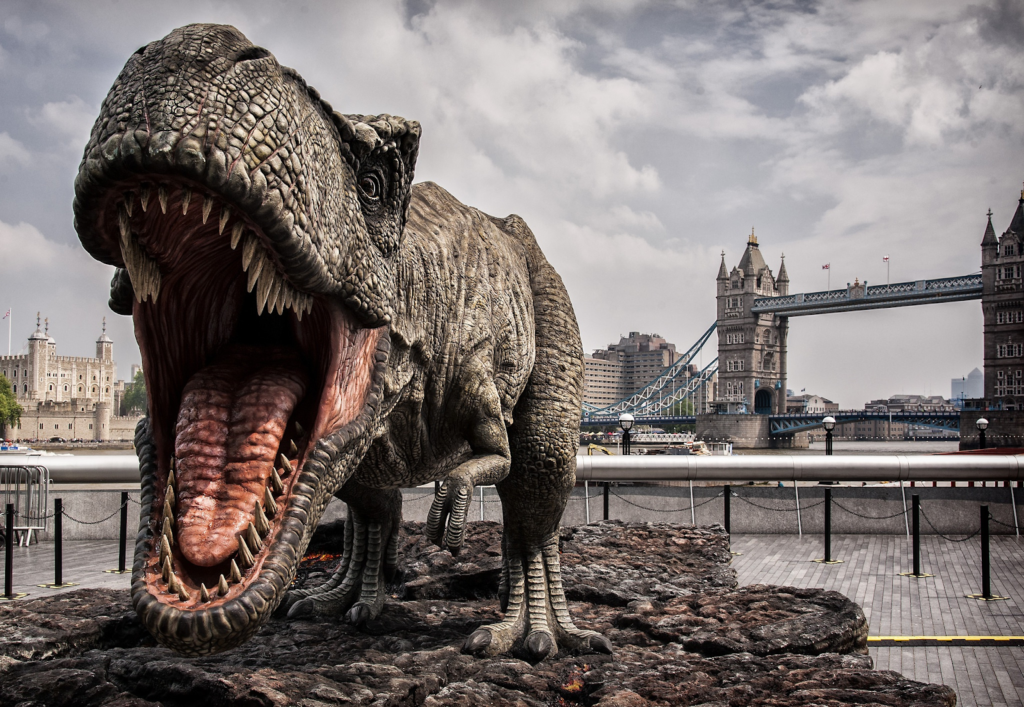
GoodFon
Imagine designing cities to accommodate massive creatures capable of knocking over buildings with one powerful step. Streets would require reinforced structures, elevated pathways, and special zones exclusively for dinosaurs. Urban planners would have to rethink transportation systems, incorporating elevated trains and underground tunnels to separate humans from these colossal creatures. Skyscrapers might feature dino-resistant materials, and open spaces would need fencing strong enough to withstand an accidental tail swipe. Beyond construction, city life would be completely different. You might hear a Brachiosaurus grazing near a park or have traffic rerouted for a migrating herd. Coexisting with dinosaurs would demand innovative solutions to ensure safety and harmony in urban environments, blending futuristic design with prehistoric challenges.
2. Agriculture Would Face New Challenges

Picryl
Farming would become an extreme sport with dinosaurs roaming the land. Herbivorous dinosaurs like Triceratops or Stegosaurus could decimate crops in minutes, forcing farmers to implement heavy-duty barriers or advanced deterrent systems. Imagine fields surrounded by electric fences that rival those in Jurassic Park. Farmers might even need to grow genetically modified plants to withstand the appetites of these giant creatures. Livestock wouldn’t be safe either, with carnivorous species potentially hunting them. The global food supply chain would need to adapt rapidly. Alternatives like vertical farming or lab-grown meat could become mainstream to compensate for losses caused by dinosaur interference. Coexisting with such massive creatures would demand ingenuity and a constant balancing act to protect both agriculture and wildlife.
3. Tourism Would Boom
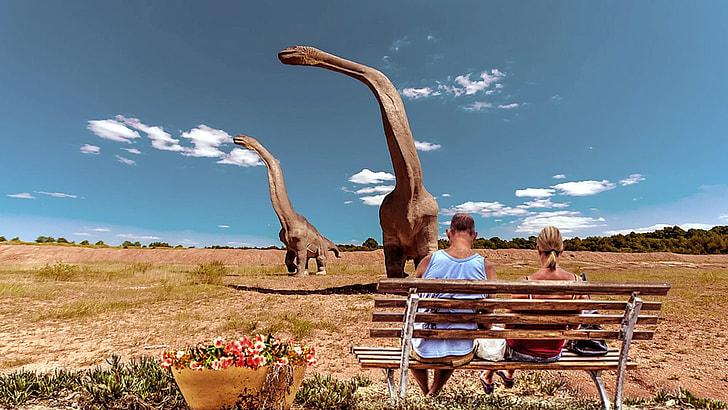
PickPik
The presence of living dinosaurs would spark a global tourism revolution. Picture safaris through dino habitats or guided tours where you could witness a herd of Parasaurolophus migrating. Theme parks and resorts catering to dinosaur enthusiasts would sprout up worldwide. However, the logistics of such attractions would be challenging. Safety measures would need to be state-of-the-art, with barriers strong enough to contain creatures weighing several tons. Ethical concerns about captivity and exploitation would also arise, leading to debates about the balance between conservation and entertainment. On the bright side, dinosaur tourism could boost local economies and provide funding for conservation efforts. The chance to observe these ancient giants in person would transform travel and create unforgettable experiences for adventurers.
4. The Food Chain Would Be Overhauled
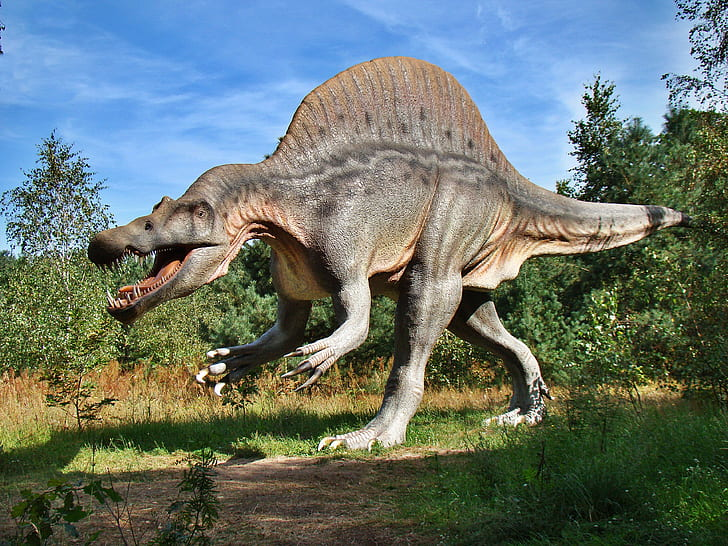
PickPik
Dinosaurs could easily disrupt the natural order, becoming apex predators or dominant herbivores. Carnivorous species like T. rex or Velociraptors might hunt not just wild animals but also livestock, affecting human food sources. Meanwhile, herbivores could outcompete existing species for vegetation, altering entire ecosystems. This could lead to cascading effects, where species dependent on those ecosystems either adapt or face extinction. On the flip side, humans might domesticate smaller dinosaurs, integrating them into the modern food chain. Imagine dino farms where creatures like Gallimimus are raised for their eggs or meat. The coexistence of humans, animals, and dinosaurs would demand a delicate balance to prevent ecological collapse while exploring new possibilities for survival and coexistence.
5. The Economy Would Shift Drastically

Picryl
The emergence of dinosaurs would revolutionize industries and create entirely new markets. Imagine companies specializing in dino-proof housing, veterinary care for prehistoric creatures, or vehicles designed to navigate dino-populated areas. Insurance firms would introduce policies for dinosaur-related damages, while food production might focus on feeding these massive creatures. Even existing industries would be impacted—fossil fuels could face renewed scrutiny as living dinosaurs remind us of their ancient origins. At the same time, niche markets could arise, like eco-tourism centered on dinosaur conservation. The economic ripple effects would be staggering, reshaping global trade and employment. The sheer scale of these changes would redefine how societies allocate resources and adapt to a prehistoric revival in modern times.
6. Science Would Enter a Golden Age

Picryl
Having dinosaurs alive would spark unprecedented scientific breakthroughs. Paleontologists could study their behavior, diet, and physiology firsthand, answering questions that fossils alone never could. Geneticists might explore the potential for cloning or disease resistance in other species by studying dinosaur DNA. Their existence could also provide insights into ancient ecosystems, helping scientists understand Earth’s history and its potential future. Advances in medicine, environmental science, and even robotics could arise from studying these creatures. Imagine robotic limbs inspired by the strength and flexibility of a raptor’s legs. The presence of dinosaurs would transform research fields and likely inspire a generation of scientists eager to unlock the secrets of these ancient beings.
7. The Military Would Weaponize Dinosaurs

DeviantArt
Dinosaurs could be turned into biological weapons in a world focused on power and defense. Picture a T. rex armored with bulletproof plating or Velociraptors trained for covert operations. Such weaponization would raise ethical questions and spark international treaties aimed at preventing their misuse. However, the allure of using dinosaurs for strategic advantage might outweigh concerns, leading to an arms race centered on prehistoric creatures. The destruction caused by weaponized dinosaurs could be catastrophic, altering global politics and security measures. Alternatively, some might advocate for using dinosaurs in non-lethal military roles, like search-and-rescue missions in disaster zones. The militarization of dinosaurs would be both a marvel of innovation and a potential harbinger of unprecedented conflict.
8. Public Safety Protocols Would Change

Creative commons
Emergency preparedness would take on new dimensions with dinosaurs in the mix. First responders would need specialized training to handle dino-related incidents, from stampedes to predatory attacks. Public drills might include evacuation plans for areas prone to dinosaur activity, much like fire or earthquake drills today. Infrastructure would require upgrades to withstand potential damage from roaming giants, including reinforced bridges and dino-safe shelters. The presence of dinosaurs would also necessitate new warning systems, such as sirens or apps alerting people to nearby creatures. Coexisting with dinosaurs would redefine public safety, blending modern technology with innovative strategies to protect communities from these ancient yet unpredictable forces of nature.
9. Dino-Powered Transportation Could Be a Reality
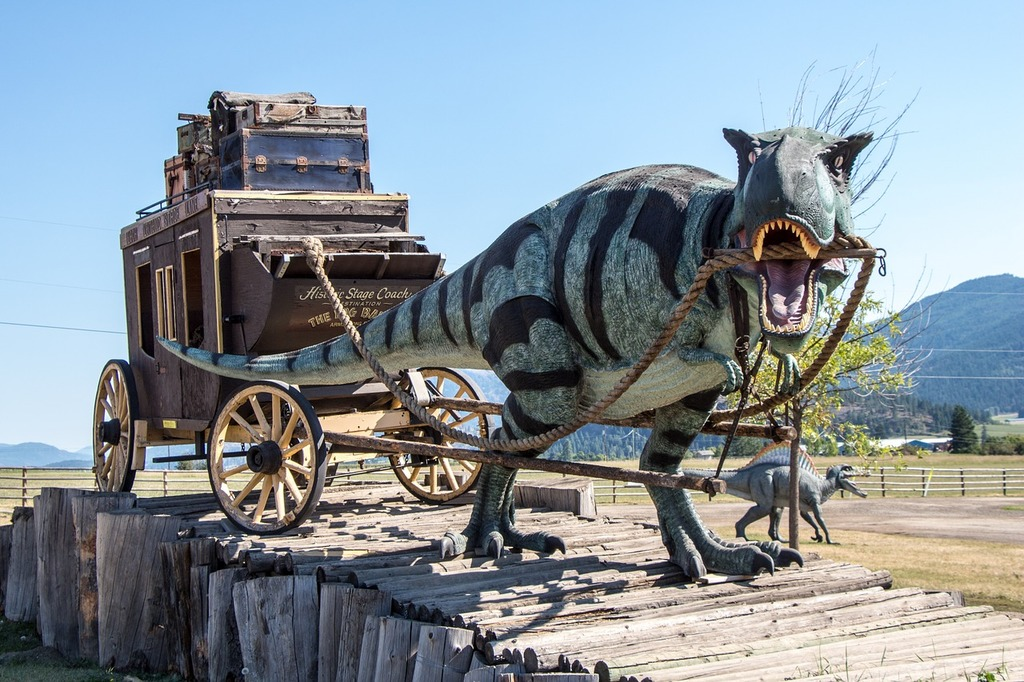
Picryl
Using dinosaurs for transportation might seem whimsical, but it could become practical with domestication. Large herbivores like Brachiosaurus could carry heavy loads, revolutionizing logistics in rural or underdeveloped areas. However, this would require extensive care, including specialized diets and habitats. Ethical concerns about exploiting these creatures for labor would likely arise, echoing historical debates about working animals. Advances in technology might merge with prehistoric power, creating hybrid systems where dinosaurs supplement modern machinery. Dino-powered transport would reshape industries reliant on heavy equipment, offering a sustainable yet challenging alternative to traditional methods. The coexistence of ancient strength and modern innovation would redefine how goods and people move around the world.
10. Legal Systems Would Need to Adapt

Pexels
The arrival of dinosaurs would bring a slew of legal challenges. Laws would need to address property damage caused by wandering giants, liability in dino-related accidents, and even ownership rights for domesticated species. Governments might establish zones where dinosaurs are protected, much like wildlife reserves, with strict penalties for harming them. Meanwhile, activists might push for “dino rights,” advocating for ethical treatment and protection from exploitation. The legal system would face the daunting task of balancing human safety with dinosaur conservation. International treaties might even emerge to regulate the trade and movement of these creatures across borders. The legal landscape would evolve to accommodate the complexities of living alongside Earth’s most iconic prehistoric inhabitants.
11. Conservation Efforts Would Dominate Global Agendas
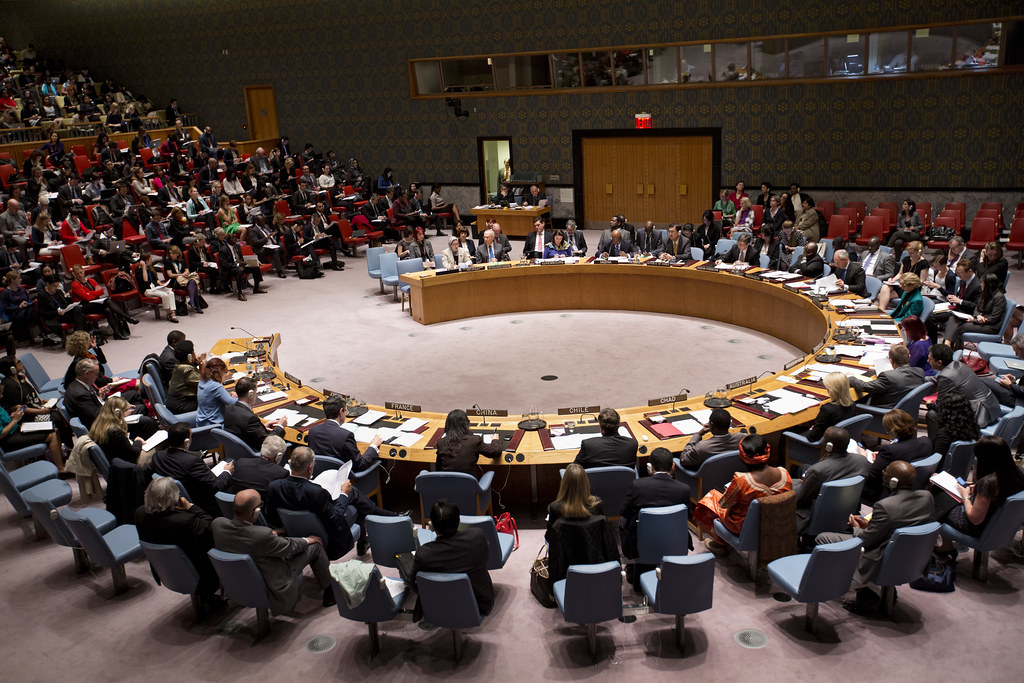
Flickr
Conservation would become a top priority as humanity grappled with the responsibility of coexisting with dinosaurs. Governments and NGOs would establish vast protected areas to ensure these creatures had sufficient space to roam and thrive. This could lead to conflicts over land use, as human populations compete for space and resources. Climate change mitigation would also take on new urgency, as the survival of dinosaurs might depend on preserving their habitats. Conservationists would face ethical dilemmas about intervening in natural behaviors, like predation or migration, to maintain balance. The presence of dinosaurs would redefine humanity’s role as stewards of the planet, blending modern conservation techniques with the challenges of a prehistoric revival.
12. Media and Pop Culture Would Explode
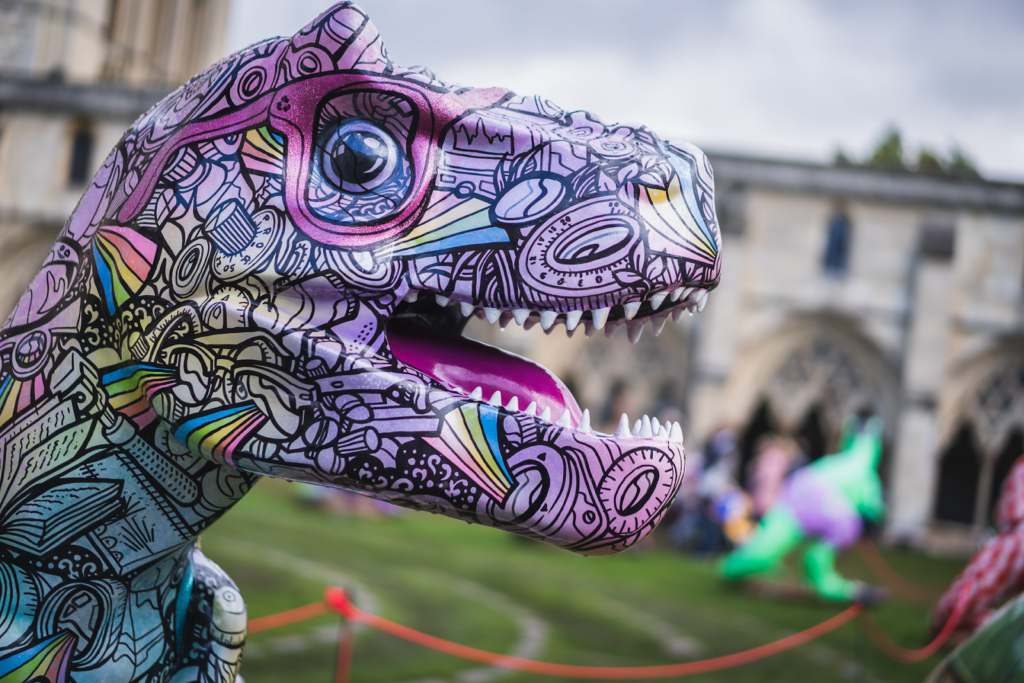
Wikimedia Commons
Dinosaurs living among us would dominate entertainment and media. Reality shows could feature live footage of their daily lives, while films might shift from science fiction to documentaries capturing their true behavior. Art, literature, and fashion would all draw inspiration from these ancient creatures, creating new cultural trends. Social media would be flooded with dino sightings, memes, and debates about their role in society. Museums and educational institutions would see a surge in interest, as people flocked to learn about their prehistoric co-inhabitants. The cultural impact of living dinosaurs would be immeasurable, transforming how humanity expresses itself and engages with the natural world.
13. Climate Change Discussions Would Intensify

FMT
The presence of dinosaurs would amplify conversations about environmental preservation. Their survival would depend on maintaining stable ecosystems, forcing humanity to prioritize climate change mitigation. Rising temperatures, habitat destruction, and pollution would directly threaten these creatures, making their plight a powerful symbol of Earth’s fragility. Governments and organizations would likely ramp up efforts to combat climate change, using dinosaurs as ambassadors for conservation. Their existence would serve as a stark reminder of the planet’s history and the delicate balance required to sustain life. Dinosaurs could inspire a global movement toward sustainability, uniting humanity in the shared goal of protecting both ancient and modern inhabitants of Earth.


